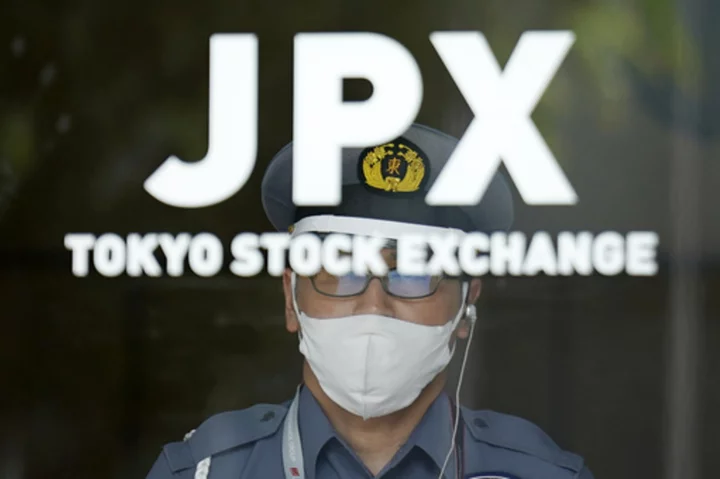TOKYO (AP) — Global shares were trading mixed on Tuesday ahead of the release of U.S. retail sales and factory data.
European shares opened higher after many Asian markets retreated. U.S. futures were little changed and oil prices advanced.
Tuesday will bring updates on sales at U.S. retailers and on factory output. Strong spending by U.S. consumers has been one of the main reasons for the economy’s resilience, driven by a remarkably sturdy job market.
This week also will bring a slew of corporate earnings reports that investors are looking to for signs of where profits for U.S. companies are heading.
France's CAC 40 gained 0.2% in early trading to 7,305.28. Germany's DAX edged up less than 0.1% to 16,080.15. Britain's FTSE 100 added 0.2% to 7,423.32.
The future for the S&P 500 was virtually unchanged. That for the Dow Jones Industrial Average edged 0.1% higher. On Monday, the S&P 500 rose 0.4%, while the Dow added 0.2% and the Nasdaq climbed 0.9%.
In Asian trading, Japan's benchmark Nikkei 225 rose 0.3% to finish at 32,493.89 after reopening from a holiday on Monday. Australia's S&P/ASX 200 shed 0.2% to 7,283.80. South Korea's Kospi lost 0.4% to 2,607.62. Hong Kong's Hang Seng gave up 2.1% to 19,015.72, while the Shanghai Composite dropped 0.4% to 3,197.82.
This week, nearly 60 companies in the S&P 500 are scheduled to report how much profit they made in April-June, giving more insights into how the U.S. economy is faring.
Expectations are modest. Analysts are forecasting the worst drop for earnings per share among S&P 500 companies since the pandemic was pummeling the economy in the spring of 2020, according to FactSet. They’re also forecasting a third straight quarter of declines in profits.
Also coming up this week will be the latest monthly update on sales at U.S. retailers. Strong spending by U.S. consumers has been one of the main reasons for the economy’s resilience, driven by a remarkably sturdy job market.
The stock market's big run has critics warning that it is not a certainty the economy will avoid a recession, that inflation will continue to coast lower and that corporate profits will recover.
The wide expectation is for the Fed to raise rates at its meeting next week, which would take the federal funds rate to its highest level since 2001. But the hope among traders nevertheless is that will be the final hike of this cycle.
In energy trading, benchmark U.S. oil rose 29 cents to $74.44 a barrel in electronic trading on the New York Mercantile Exchange. It dropped $1.27 to $74.15 per barrel on Monday. Brent crude, the international standard, fell 24 cents to $78.74 per barrel.
In currency trading, the U.S. dollar fell to 138.17 Japanese yen from 138.71 yen. The euro cost $1.1249, up from $1.1240.









